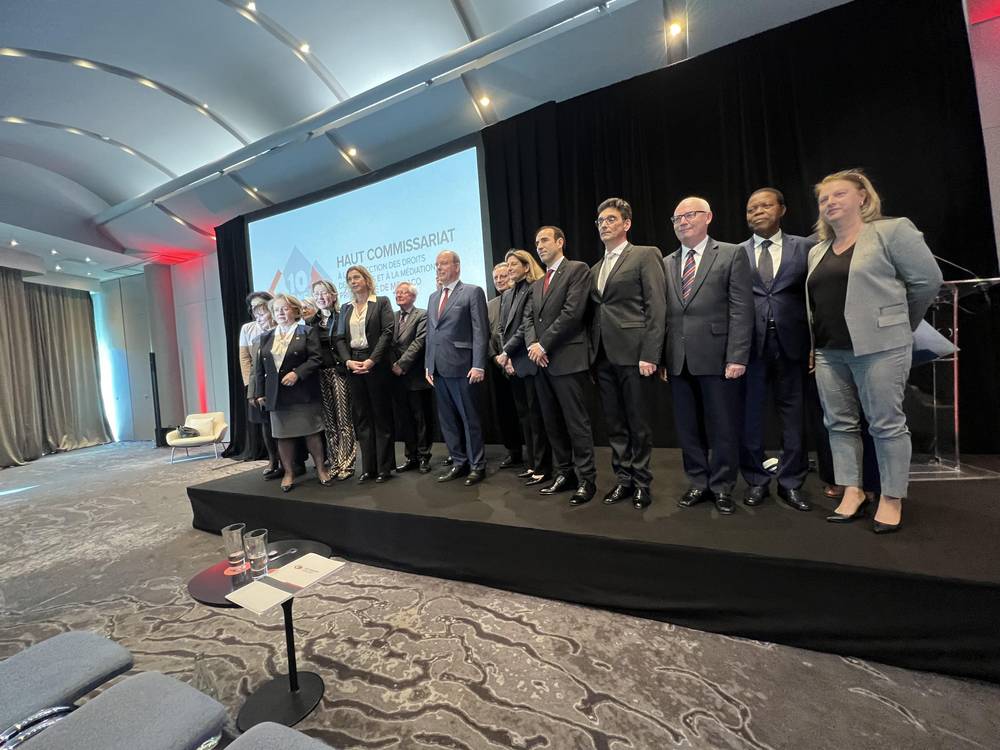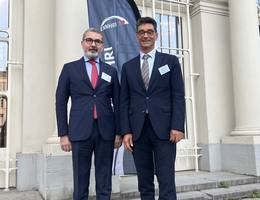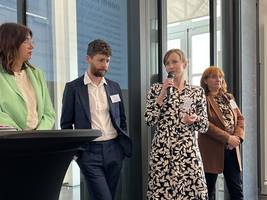Human Rights Ombudsman Peter Svetina participated at the general assembly and conference of the European Network of National Human Rights Institutions (ENNHRI) in Brussels. This year, ENNHRI, of which the Slovenian institution of the Human Rights Ombudsman has been a long-time member, celebrates the 10th anniversary of operation. The celebration was attended by more than 200 representatives of national institutions for human rights and other organisations or institutions, including the European Commission, Council of Europe, OECD, OSCE, and UN, while the participants were addressed by the Council of Europe Commissioner for Human Rights Dunja Mijatović. The red thread of the conference was the vision for the next 10 years and in the forefront of talks was the issue of how to inspire and encourage countries to more persistently strive and fight for human rights and for a just, tolerant, and safe society.
Invited by the organiser, Ombudsman Svetina participated at the conference as a speaker at a roundtable discussion about challenges in the field of human rights, primarily in the fields of digitalisation, artificial intelligence, and climate change. He emphasised the importance of an open dialogue and said that there will be no efficient solutions without concerted efforts. He also shed light on the role of the institution of Human Rights Ombudsman of the Republic of Slovenia as the national institution for human rights and its work in the mentioned fields.
Ombudsman Svetina highlighted the significance of ENNHRI’s operation and its efforts for the promotion of human rights in the field of artificial intelligence on the European level. He added that this organisation has made an important step in this field by adopting a common position – the EU Act on Artificial Intelligence. Svetina estimated the collaboration between the ENNHRI and the Slovenian Human Rights Ombudsman as excellent and announced that at the end of November they will host an expert event together in Ljubljana intended for the strengthening of knowledge in the field of artificial intelligence.
“The Human Rights Ombudsman has not encountered any concrete examples of abuse of artificial intelligence on the national level, yet we stay cautious since with numerous benefits of artificial intelligence in this field, there also exist a plethora of potential dangers for human rights,” said Svetina. He especially stressed that the institution of the Ombudsman supports the efforts of the Council of Europe for arrangement of the development and use of artificial intelligence based on the standards of human rights, democracy, and the rule of law.
He also warned about the importance of inclusive digitalisation, the key components of which are the protection of privacy, the fight against online fraud and violence, and digital literacy. The Human Rights Ombudsman supports non-governmental organisations which bring awareness and educate about digital tools, said Svetina and stood for the accessibility of information for all, including those who are not skilled in digital technologies. Related to this he also mentioned the so-called Ombudsman’s Corners, which are installed in Slovenian municipalities by the institution of the Ombudsman and thus provides accessibility of information about the work of the Ombudsman for all people, regardless of their literacy level, in analogue and digital forms.
As the second important emerging challenge in the field of human rights Ombudsman Svetina sees the climate crisis. He recalled the consequences of recent meteorological disasters in Slovenia and around Europe and emphasised the urgency of decisive measures on all levels. “The consequences of inefficient environmental protection because countries often neglect their preventive role are borne, both in the economic and healthcare sense, by the present and future generations. Climate change is hidden in the background of a major part of economic and war migrations, therefore we should already have shifted from the theoretic search for solutions and dialogue about the importance of green transition to measures that are visible and have the effect in practice,” he observed. In his speech, Ombudsman Svetina praised the participation of ENNHRI in three historical cases in the field of the environment before the European Court for Human Rights and added that a clean, harmless to health, and safe environment is a fundamental human right deriving from the right to human dignity and is thus a foundation for the implementation of all other rights. “We must come united before the challenges presented by the combination of digitalisation, artificial intelligence, and climate change so that we can protect the inviolability of human rights. We are at a crossroads, which on the one side offers unlimited potential and on the other unimagined traps, since irresponsible use of technologies can endanger our fundamental freedoms. If we want to protect the rights of all, regardless of age, background, or circumstances, we must put ethics and dignity on a pedestal. This must be our clear goal, since I believe that on this developmental path we want to leave nobody behind,” concluded Ombudsman Svetina.
Video - NHRIs take to the European stage: interventions in landmark climate cases






